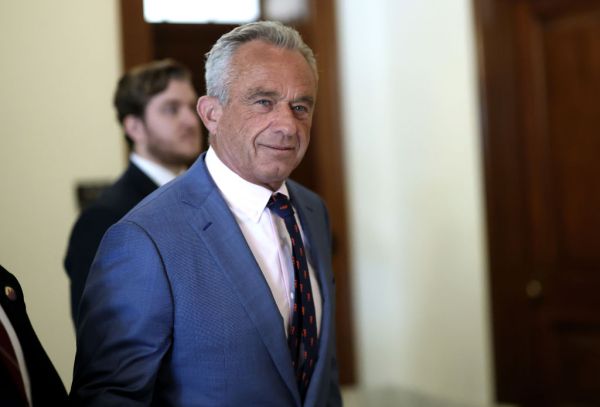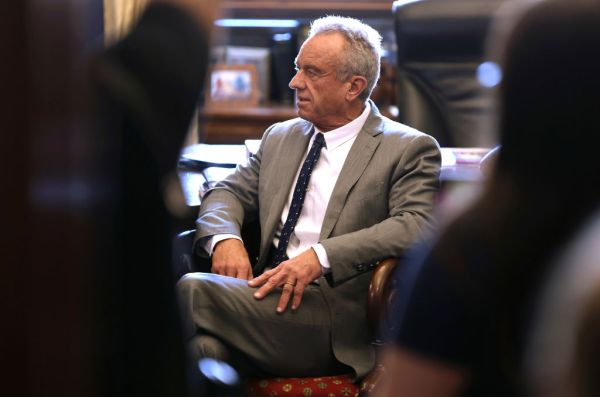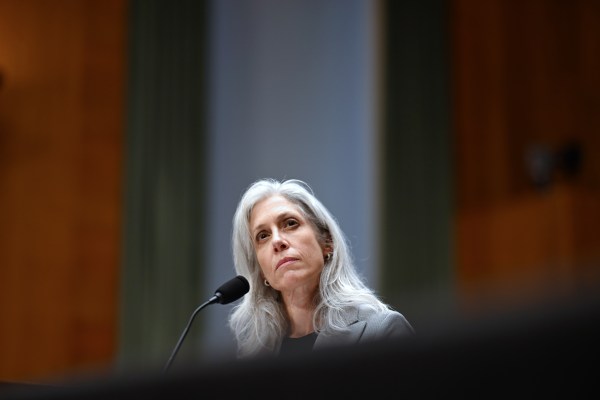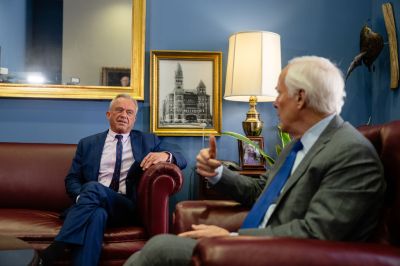When Donald Trump named Robert F. Kennedy Jr. two months ago today as his pick for secretary of the Department of Health and Human Services, there was widespread speculation that two big issues—vaccines and abortion—could sink the former Democrat.
But two months later, Kennedy has managed to keep his head above water by modifying his rhetoric on vaccines and promising in meetings with Republican senators to implement whatever agenda Trump wants on abortion.
Still, Kennedy’s confirmation remains in doubt in a Senate that will be controlled 53-47 by Republicans once Vice President-elect J.D. Vance’s replacement is named. It could very well turn on his performance during confirmation hearings, where he will have to account not only for his past rhetoric but detail how he would wield power as the nation’s top public health official.
Among the handful of Republicans who could vote against Kennedy, perhaps the three most likely to do so are moderates Susan Collins of Maine and Lisa Murkowski of Alaska, plus Mitch McConnell of Kentucky, who is a polio survivor. “Efforts to undermine public confidence in proven cures are not just uninformed—they’re dangerous,” McConnell said in December. “Anyone seeking the Senate’s consent to serve in the incoming administration would do well to steer clear of even the appearance of association with such efforts.”
Kennedy has, of course, made a career of undermining confidence in proven vaccines, including those for polio and measles. He has said “there is no vaccine that is safe and effective,” and his lawyer and top adviser has asked the FDA to revoke approval of the polio vaccine. “I see somebody on a hiking trail carrying a little baby and I say to him, ‘Better not get him vaccinated,’” Kennedy said on a podcast in 2021.
Behind closed doors, Kennedy is reportedly singing a somewhat different tune. In December, Oklahoma GOP Sen. Markwayne Mullin said Kennedy told him: “I 100% support polio vaccination.” And Kennedy insists publicly he won’t “take away anybody's vaccines.”
But Kennedy will need to get into specifics at his confirmation hearings. Yuval Levin of the American Enterprise Institute told The Dispatch that Kennedy would “have the authority to basically decide, as the secretary, what’s on the vaccine schedule” produced by the Centers for Disease Control and Prevention that guides parents, pediatricians, and schools on vaccine requirements and recommendations for children. Kennedy would be able to exercise this authority, Levin said, both by potentially picking members of advisory committees that make such decisions and overruling the committees if he so desired.
“He also has real power over the messaging of public health in America,” Levin said, that would allow him to “change the atmosphere around these issues.” Since the pandemic, vaccination rates for kindergarteners for measles, polio, and whooping cough have dropped 2-3 percentage points below the federal government's target of 95 percent, and an anti-vaccine HHS secretary could help drive them even lower.
Levin noted that Kennedy could also use the bully pulpit to wield influence on issues where HHS has no formal authority, such as fluoridation of water, which is a state and local issue.
Whether these issues are enough to defeat Kennedy remains to be seen. Louisiana GOP Sen. Bill Cassidy, a doctor and the chairman of one of the committees that will hold Kennedy’s confirmation hearings, said last week he had a “frank conversation” with Kennedy during which the two men “spoke about vaccines at length.” When pressed for details about the conversation, Cassidy told The Dispatch in the Capitol he had “nothing more to add.”
While the vaccine issue could still cost Kennedy a Cabinet seat, he’s faced surprisingly little opposition from the pro-life movement over his support for an expansive right to abortion.
When Trump first announced Kennedy as his HHS pick, former Vice President Mike Pence urged Senate Republicans to reject the nomination on the grounds that Kennedy would be the “the most pro-abortion Republican appointed secretary of HHS in modern history.” New York Times columnist Ezra Klein made the case that Democrats could be tempted to vote for RFK on those same grounds. HHS “has a lot of reach into reproductive rights,” Klein tweeted. “In the end, it's the pro-life groups I expect will try to sink this nomination.”
But over the course of the following two months—due to some combination of fear of Donald Trump, loyalty to him, and transactional politics—pro-life groups have done little to oppose Kennedy. Some, like the Heritage Foundation, actively supported Kennedy from the beginning. Susan B. Anthony Pro-Life America President Marjorie Dannenfelser expressed “concerns” about the nomination in November, but the group, which is the largest pro-life organization in the country, has not opposed it.
In fact, Tim Chapman, the president of Advancing American Freedom, the political group founded by Mike Pence, said he is unaware of any other pro-life groups that have publicly come out against the RFK nomination. “There’s a very quiet, not spoken, but very real concern about RFK leading HHS, but what you’re seeing is a pro-life movement that feels like it’s been losing a lot, and that that movement feels in many ways like they can’t afford another loss,” Chapman told The Dispatch. “So to speak up about their concerns about RFK, but then get completely rolled in the confirmation process would project weakness.”
“It’s just strange for an issue advocacy group to say they don’t want to advocate for their issue because they’ll get on the wrong side of a person who disagrees with them,” said AEI’s Levin. “Then what really is the purpose of these groups? They obviously should be pressing for a pro-life HHS Secretary in a Republican administration, and there’s no way around the fact that not having one would be a huge loss for them.”
Fear of getting rolled by Trump only partly explains the institutional pro-life movement’s acquiescence to RFK. It can also be explained by transactional politics: Kennedy has told Republican senators he would reinstate almost all of the abortion policies in place during the first Trump administration—from conscience protections to issues touching on taxpayer-funding of organizations that perform or promote elective abortions. Joshua Mercer of Catholic Vote told The Dispatch his group was backing RFK because he’s an important part of the Trump coalition and had pledged to senators to name pro-life deputies and implement most of those pro-life policies at HHS. “We've been quite clear that there are areas in which we're just going to disagree,” Mercer said.
In the Capitol last week, Missouri GOP Sen. Josh Hawley told The Dispatch that the only abortion-related HHS policy from Trump’s first term about which RFK was “noncommittal” was reinstating an FDA requirement that the abortion drug mifepristone to be prescribed in-person, a rule the Biden administration ended in 2021. “On mifepristone, he said he had not gotten explicit direction from Trump, but he would do whatever Trump wanted,” Hawley said. Montana Sen. Steve Daines, founder of the Senate Pro-Life Caucus, told The Dispatch he also spoke to Kennedy about the 2021 FDA abortion-pill rule, and the conversation “piqued his interest.” Daines said he intends to vote to confirm Kennedy.
While the highest profile issues will be submitted to the White House for a decision, there are many that won’t. “There are all kinds of decisions that the Cabinet secretaries deal with that really never go to the president,” Tevi Troy, who served as deputy secretary of HHS under Geroge W. Bush,” told The Dispatch. “The HHS secretary gets to frame questions that come to the White House.”
“There are going to be IVF choices to make. There are going to be NIH funding decisions to make on embryo research,” said AEI’s Levin. “There are going to be a lot of live issues here that aren’t just the standard [Republican/Democrat] flip-the-switch kind of issues.”
For example, current HHS Secretary Xavier Becerra issued guidance after the Dobbs decision telling hospitals that they have an obligation to perform abortions in certain emergency situations under the Emergency Medical Treatment and Active Labor Act (EMTALA). The Biden administration then sued the state of Idaho, resulting in a somewhat convoluted case that made its way to the Supreme Court. Before the high court, the federal government identified eight conditions where abortion was required under EMTALA; the state of Idaho replied that its abortion law allowed immediate treatment for all eight conditions. Unsure of whether a conflict between state and federal abortion law really existed, Justices Amy Coney Barrett, Brett Kavanaugh, and John Roberts voted to send the case back down to lower courts for review.
The simplest way to end the litigation would be to revoke Becerra’s guidance, but a sophisticated and sincere pro-life administration would work with states to ensure medical providers know it is possible to treat life-threatening conditions immediately without running afoul of abortion laws. “HHS could coordinate with state health departments, for one thing, in a way that doesn’t bind anybody, but that creates a path that is more likely to avoid these problems,” said Levin. “Or they could do things formally through Medicaid. In particular, they could get into real agreements with state health departments if that’s what they wanted to do. But again, I think that would take a creative pro-life team, and they’re just not going to have one.”
In a 53-47 GOP Senate, the big question is not only whether four Republicans will vote against Kennedy but how many Democrats he might pick up. After losing in November, some Democrats seem eager to bring RFK Democrats back into the fold—notwithstanding his opposition to vaccines and promotion of conspiracy theories. For example, Colorado Gov. Jared Polis, a Democrat, praised the RFK nomination, and Sens. Bernie Sanders and John Fetterman are reportedly open to voting to confirm RFK.
“Republican senators should be much more uncomfortable about what they’re being pushed to do here than they seem to be,” Levin said. “He is a kind of leftist activist on the one hand, and he’s not pro-life on the other hand. This should be a big issue here. … I wonder if the hearings in the process will force them to confront that, but they’re certainly trying not to. And so far, a lot of the outside groups are letting them get away with it.”







Please note that we at The Dispatch hold ourselves, our work, and our commenters to a higher standard than other places on the internet. We welcome comments that foster genuine debate or discussion—including comments critical of us or our work—but responses that include ad hominem attacks on fellow Dispatch members or are intended to stoke fear and anger may be moderated.
With your membership, you only have the ability to comment on The Morning Dispatch articles. Consider upgrading to join the conversation everywhere.